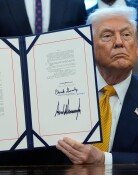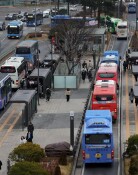[Editorial] Refreshed Meaning of the Liberation Day
[Editorial] Refreshed Meaning of the Liberation Day
Posted August. 15, 2001 08:47,
It has been 56 years since the Liberation. It is not passively obtained liberty from Japanese Occupation. The Liberation has an active meaning to recover our sovereignty and build our nation for unification among people. In this aspect, the separated North and South, which have persisted over half a century, mean that we are not in the genuine Liberation yet.
Although we took a first step for peaceful coexistence through the last year`s June 15 summit, it is doubtful whether or not it may lead to the unification. In particular, to achieve the unification on the ground of liberal democracy regime, we should keep constant effort and preservation of patience will be required.
For such efforts and patience, a democratic consensus is absolutely required in our society. The consensus, which may converge from various opinions through mutual understandings and respects, bears the highest value and power in democratic society. However, what does the current Korean society look like, even after the lengthy democratization process?
Yesterday, 115 seniors from various areas issued a statement, worriedly saying, ``We are in a `shaking country` under mistrust and hostility, obsessed with concerns.`` The statement pointed out, ``What happens here is too bloody to open `an old historical archive` and separate friends and foes dichotomously with all efforts.``
It is a painful critique that the current society appears like that of half a century ago when sharp conflicts and national divisions prevailed.
Ruling parties should pay attentions to the critiques of the seniors. Review and reflection must be given to various aspects; what have caused our society to be separated among friends and foes, where the biggest responsibility is located, why is there a critique about the identity of our government in that it appears socialistic despite the fundamentals of `democracy and market economy` and how come the government is charged with the allegations of the democracy defamation? Questions should be asked about whether these conflicts and divisions might have come from the self-righteousness and misleading sense of superiority, when there are different opinions.
As the seniors said, such conflicts and divisions cannot lead to trust and consensus without changing the consciousness from `monopolistic power` to `serving power`. Of course, we cannot blame the ruling parties for all the responsibilities of conflicts and divisions. However, if political power is obsessed with the interests of the ruling parties rather than the harmony of people and society, this will accelerate the divisions and lead to nothing in terms of consensus. Now we should appreciate the genuine meaning of the Liberation.







